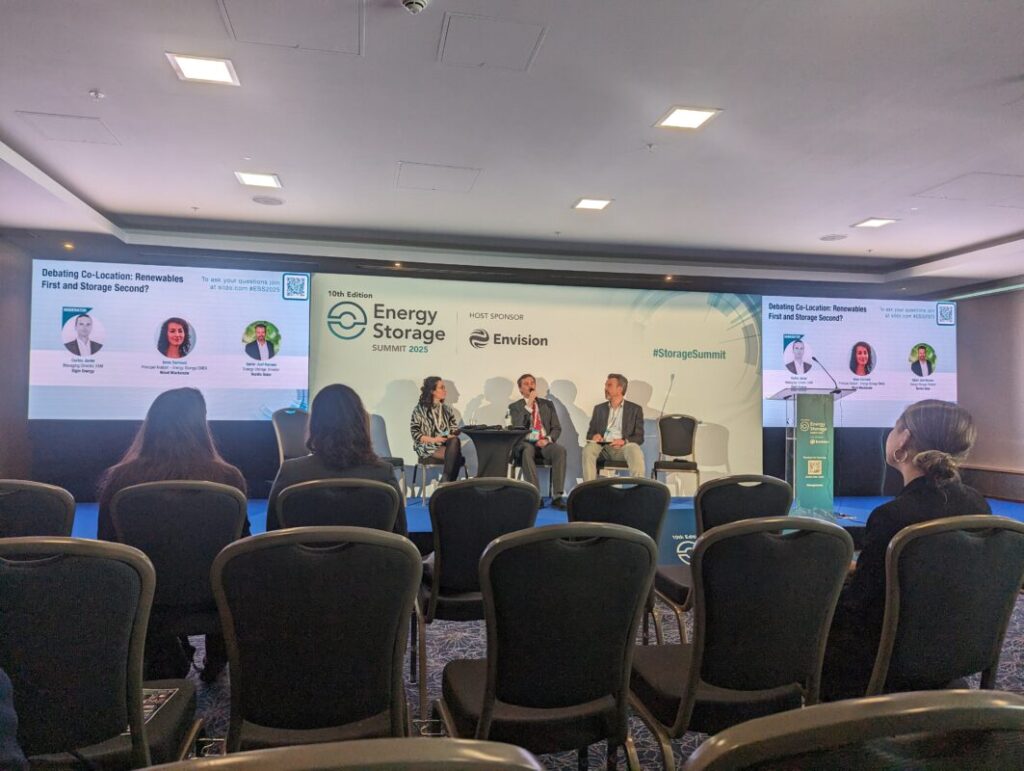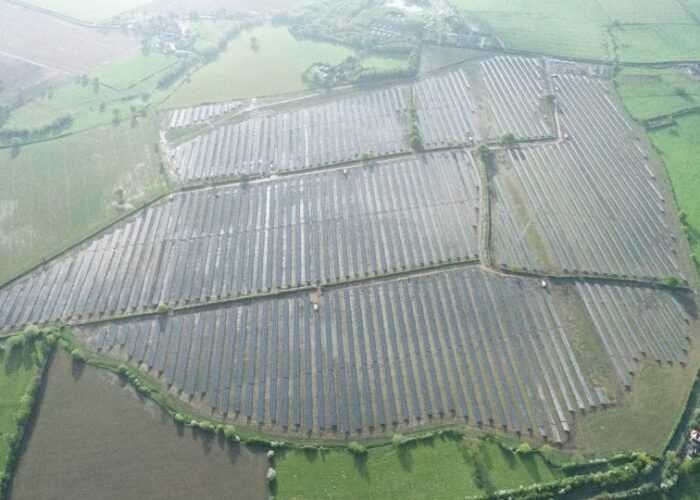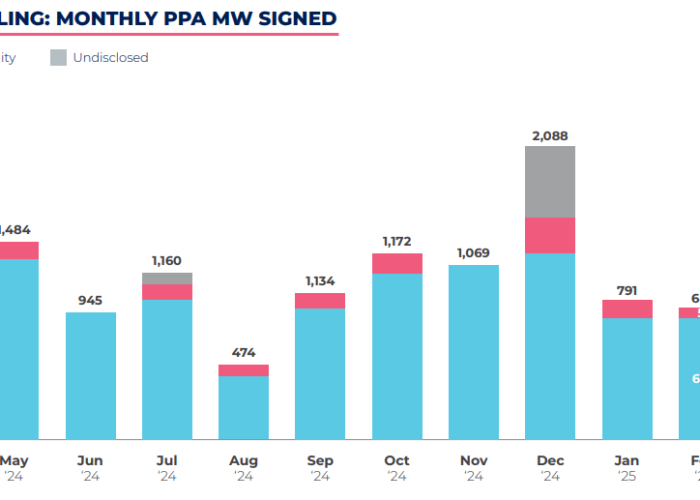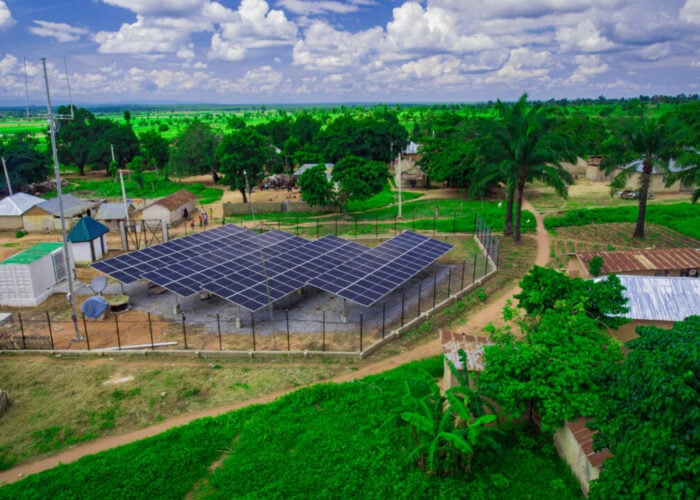
According to Søren Juel Hansen, energy storage director at Nordic Solar, renewable energy and storage assets are best thought of as “two business units sharing an address”.
This was one of Juel Hanson’s key conclusions, from the last panel on co-located renewable energy and storage at this year’s Energy Storage Summit event, held this week in London. On a panel on the relative merits of co-located storage projects, versus standalone facilities, he said that market dynamics continue to play a role in deciding whether to invest in one type of project or another, but that solar and storage are “obvious partners”.
Unlock unlimited access for 12 whole months of distinctive global analysis
Photovoltaics International is now included.
- Regular insight and analysis of the industry’s biggest developments
- In-depth interviews with the industry’s leading figures
- Unlimited digital access to the PV Tech Power journal catalogue
- Unlimited digital access to the Photovoltaics International journal catalogue
- Access to more than 1,000 technical papers
- Discounts on Solar Media’s portfolio of events, in-person and virtual
Or continue reading this article for free
“System fundamentals are pro-co-location,” said Juel Hanson. “We used to say: ‘renewables first’, but that was when solar was a limited part of the energy mix. Solar and storage are obvious partners because solar is so predictable, and most markets, except for maybe Finland, have a saturated demand for energy, with solar providing the most, leaving battery energy storage systems (BESS) … with no conflicting interests.”
“We go for co-located, but we see them as two business units sharing an address and a grid connection,” he continued, and when asked about whether his company would prioritise investing in a solar or storage project before another, added: “For us, it’s nothing ‘first’, it’s all together.”
This sentiment was echoed by Anna Darmani, principal analyst for energy storage in Europe, the Middle East and Africa, at Wood Mackenzie, who also spoke on the panel. Darmani suggested that, across Europe, investors and developers have consistently prioritised investments in technologies with attractive prices.
“In Europe, so far, we’ve seen investment in the energy storage market in the countries where there was an ancillary market, [where] the prices of the ancillary market were attractive,” said Darmani. “Most of the investment in the European storage market was coming because of the ancillary market, and then the ancillary market got saturated, so everyone started thinking ‘so what?’.
“Then volatility came into the picture, so they wanted to do energy trading,” Damani continued, highlighting how the attention could now shift back towards the renewable power generation space. “When you’re energy trading, you want to be with the solar plants, so from a storage perspective the mindset is shifting … towards energy trading and arbitrage opportunities.”
Financial and grid benefits
Both panellists’ comments reflect earlier sentiments expressed at the event, that solar-plus-storage is an attractive investment destination, and that both types of storage projects can be effective hedges for renewable power projects, further improving their attractiveness to investors.
The two speakers also used the extended metaphor of purchasing cars to describe how the cost of buying battery components and projects has fallen considerably in recent years, and that this trend could continue in the future.
“A few years ago, buying batteries was like buying rare Ferraris; today it’s like buying a Porsche,” said Juel Hansen. “To buy a Porsche just to support your Volkswagen – your PV park – it’s too expensive. We need that Porsche to run fully for the grid and for every revenue opportunity, be that intraday or whatever.”
“I think soon [batteries] are going to be Volkswagens,” added Darmani. “In 2024 we saw prices drop by 40%; I think it’s going to be a slow decline until the market reaches a state of equilibrium. I don’t think they’re going to go back up any time soon.”
Juel Hansen went on to suggest that the falling cost of co-located projects could help to overcome one of the much-discussed challenges in the European power sector: the difficulties and expense of expanding and improving grid infrastructure. Belgian think tank Bruegel suggested earlier this year that Europe’s grids would need a mammoth annual investment of €65-100 billion (US$67.7-104.2 billion) each year until 2030 to facilitate the commissioning of the new renewable power generation capacity needed to meet the continent’s climate change goals.
“We have grids that can take much more renewables and much more consumption, but only if we do distributed storage,” said Juel Hansen, who added that batteries can be deployed much more quickly than grid infrastructure. “It takes – we all know it – five-to-20 years to expand a grid, and it takes one-to-two years to build a battery.”
“If you have a local area, where you have an industrial area and a solar park, if you add a battery you have a local grid,” continued Juel Hansen. “You save a lot on transport to far-away generation – [and] suddenly you can sell more capacity to the solar park – and you can let more consumers come in, rather than building out a grid ten years down the line.”
“That is the way forward,” he said. “Grid operators, unfortunately, still live in an old world, and, of course, electricity systems are more than 100 years old, but so much has changed in the last 120 years.”







